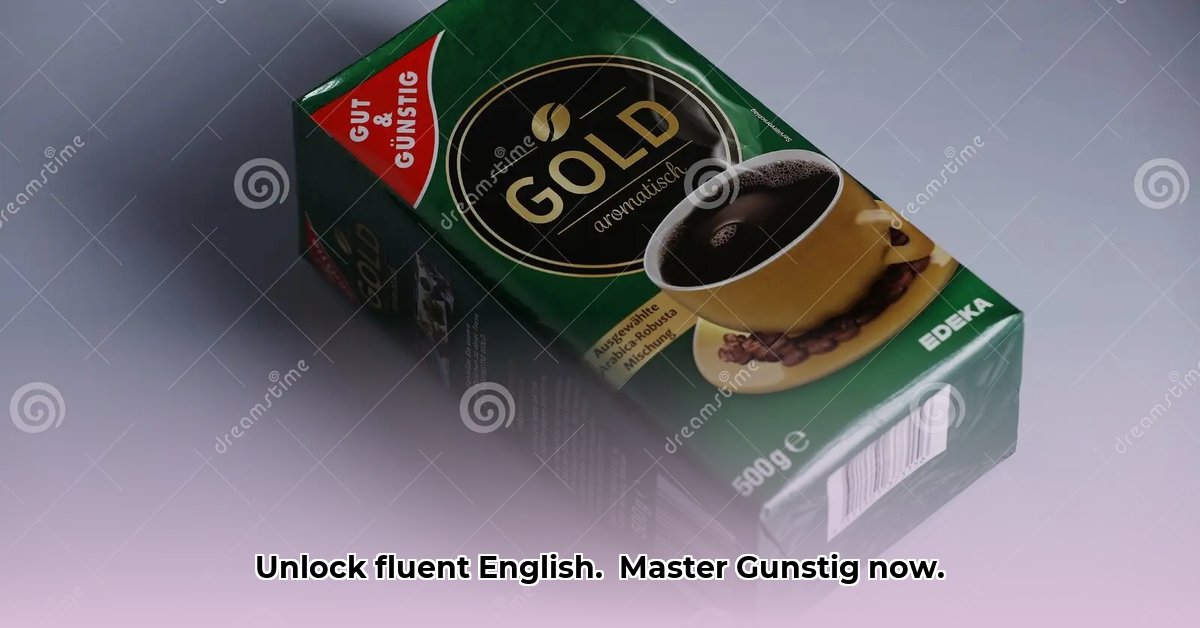
Gunstig: Cracking the Code of this Versatile German Word
Right, so you're tackling "günstig," are you? It's a real head-scratcher, isn't it? This seemingly simple German adjective doesn't have a single perfect English equivalent. Sometimes it means "cheap," other times "convenient," and sometimes even "favourable." Getting it wrong can lead to misunderstandings, especially in formal settings. This article will provide a comprehensive guide to navigating the nuances of "günstig" and ensuring accurate translations.
Understanding the "Gunstig" Chameleon
"Günstig" is a linguistic chameleon, shifting its meaning depending on the context. In one sentence, it might describe something inexpensive; in another, it could highlight convenience or even advantageous circumstances. Its adaptability makes it a fascinating—and challenging—word for translators.
Consider these examples: "günstige Flüge" (cheap flights) clearly signifies affordability, while "günstige Gelegenheit" (favourable opportunity) implies a positive and advantageous situation. The key to understanding "günstig" lies in analyzing its surrounding words and the overall sentence structure.
Dictionaries: Helpful, But Not Always Definitive
Even reputable dictionaries sometimes present a range of possible translations for "günstig." This isn't a sign of inaccuracy; it reflects the word's inherent flexibility. The challenge for a translator is to select the translation that best reflects the specific context and intended meaning.
Decoding "Gunstig": A Step-by-Step Approach
Here's a practical, step-by-step guide to accurately translating "günstig":
Contextual Analysis: What's the overall subject of the sentence or passage? Understanding the broader context is the cornerstone of accurate translation. Is it about pricing, timing, or favourable conditions?
Register Consideration: What's the formality level? A formal business document requires different wording than a casual conversation. Your choice of English equivalent should reflect this formality.
Clue Identification: Look for contextual clues, nearby synonyms, or other words that hint at the intended meaning of "günstig." These clues often provide the most accurate guidance.
Translation and Refinement: Select an appropriate English translation and test it within the sentence. Does it sound natural, convey the correct meaning, and fit the overall tone? Refine as needed.
Human Expertise (When Necessary): For high-stakes translations (legal, financial, etc.), human expertise is crucial for accuracy. A qualified translator can navigate the subtleties of "günstig" in such critical contexts.
How to translate günstig accurately considering grammatical context and register
Mastering "günstig" requires more than simply memorising a few vocabulary entries. It's about developing a deep understanding of its contextual uses, grammatical function, and the subtleties of the German language. This section will delve deeper into these aspects.
Understanding the Nuances of "Günstig"
"Günstig", much like the English word "favorable," can relate to price, timing, conditions, or even luck. The challenge lies in translating the subtle differences which often determine the most appropriate English equivalent.
Is the sentence focusing on cost? Then words like "affordable," "inexpensive," or "budget-friendly" might be appropriate. However, should it be referring to advantageous circumstances, "favourable," "convenient," or "opportune" may better capture the nuance.
A Practical Guide to Accurate Translation: A Refined Approach
Let's refine our step-by-step approach, adding more precise instructions:
Grammatical Function: How does "günstig" function grammatically within the sentence? Is it an adjective modifying a noun, or an adverb modifying a verb? This influences translation choices.
Semantic Field: What's the overall semantic field of the text? Is it focused on economics, opportunity, or logistics? Identifying the semantic field helps to narrow the viable synonyms.
Synonym Selection: Choose the English synonym that not only translates the literal meaning but also captures the intended nuance. Consider synonyms such as:
- For price: affordable, inexpensive, reasonable, cheap (use cautiously), budget-friendly, competitively priced.
- For opportunity/circumstances: favorable, advantageous, opportune, auspicious, propitious.
- For convenience/timing: convenient, opportune, timely, well-timed.
Idiomatic Expression: Ensure that the translated phrase sounds natural and idiomatic in English. Avoid unnatural-sounding word combinations.
Contextual Testing: Test your translation within the entire passage. Does it fit the surrounding text and maintain the intended meaning?
Common Pitfalls and How to Avoid Them
Literal Translations: A direct translation of "günstig" as "cheap" is often misleading and inaccurate. It rarely conveys the full meaning.
Overlooking Context: This is the most significant error. Always thoroughly analyse the context before selecting a translation.
Ignoring Register: Using informal language in formal contexts, or vice versa, will create an inconsistent and unprofessional tone.
Ignoring Grammatical Function: Misinterpreting the grammatical role of "günstig" can lead to incorrect translation.
Examples in Action: Illustrative Cases
"Das Angebot ist günstig." (The offer is good/favourable/affordable/reasonable, depending on context). For example, referring to price it would be better translated as "The offer is affordable.", whereas referring to conditions it could be translated as "The offer is favourable."
"Die Umstände waren günstig." (The circumstances were favourable/advantageous/opportune).
"Ein günstiger Zeitpunkt." (A convenient time/An opportune moment/A favourable time).
Key Takeaways:
- Accurate translation of "günstig" hinges on understanding its multifaceted meanings.
- Context, register, and grammatical function are all critical considerations.
- Careful synonym selection and idiomatic expression are essential for achieving natural and accurate translations.
- Avoid literal translations; always focus on conveying the intended meaning.
- Continuous learning and practice are key to mastering the intricacies of "günstig."